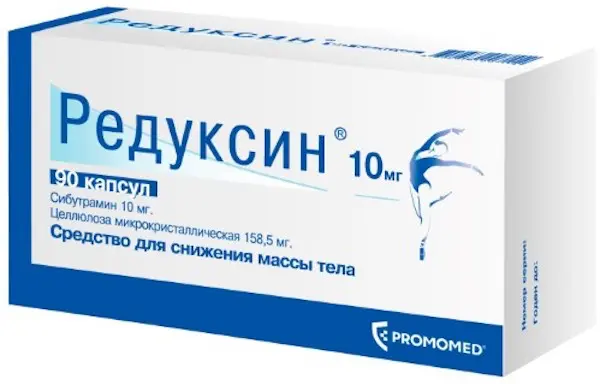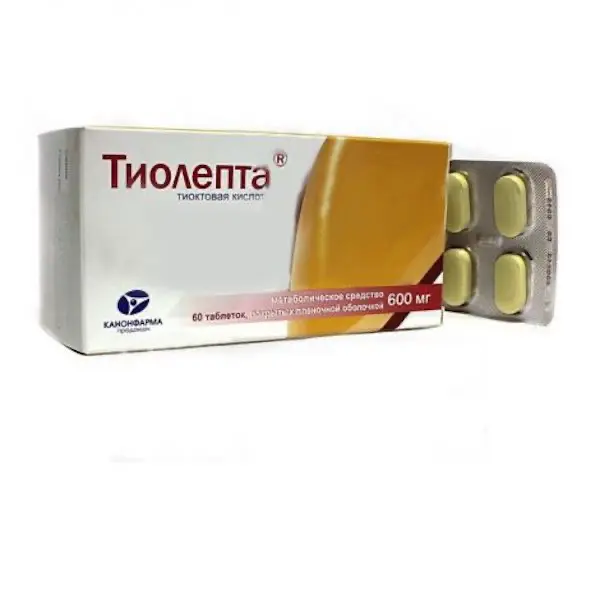Description
Reduxin Pharmacodynamics
Sibutramine is a prodrug and exerts its effect in vivo due to metabolites (primary and secondary amines) inhibiting monoamine reuptake (mainly serotonin and noradrenaline). Increased neurotransmitter content in synapses increases the activity of central 5NT-serotonin and adrenergic receptors, which contributes to an increased feeling of satiety and a decreased need for food, as well as increased thermoregulation. By activating beta3-adrenoceptors indirectly, sibutramine affects brown adipose tissue.
Weight loss is accompanied by an increase in serum HDL concentration and a decrease in triglycerides, total cholesterol, LDL, and uric acid. Sibutramine and its metabolites do not affect monoamine release, do not inhibit MAO; have no affinity for a large number of neurotransmitter receptors, including serotonin receptors (5-HT1, 5-HT1A, 5-HT1B, 5-HT2A, 5-HT2C), adrenergic (beta1, beta2, beta3, alpha1, alpha2), dopamine (Dl, D2), muscarinic, histamine (H1), benzodiazepine and NMDA receptors.
Indications
Reduxin is indicated for weight loss in the following conditions:
-alimentary obesity with a body mass index (BMI) of 30 kg/m2 or more;
-Obesity with a BMI of 27 kg/m2 or more with other risk factors due to excessive body weight, such as diabetes mellitus type 2 or dyslipoproteinemia (lipid metabolism disorder).
Contraindications
-Established hypersensitivity to sibutramine or other components of the drug;
-The presence of organic causes of obesity (e.g., hypothyroidism);
-Serious eating disorders – anorexia nervosa or bulimia nervosa;
-psychiatric disorders;
-Gilles de la Tourette syndrome (generalized tics);
– concurrent use of MAO inhibitors (e.g., phentermine, fenfluramine, dexfenfluramine, ethylamphetamine, ephedrine) or their use for 2 weeks before prescription of Reduxin; use of other drugs acting on the central nervous system (e.g., antidepressants, neuroleptics); drugs prescribed for sleep disorders containing tryptophan, and other drugs of central action to reduce body weight;
-ischemic heart disease, decompensated chronic heart failure, congenital heart defects, occlusive peripheral artery disease, tachycardia, arrhythmia, cerebrovascular disease (stroke, transient
Dosage and administration
- Reduxin is prescribed orally once a day. The dose is adjusted individually, depending on tolerance and clinical effectiveness. The recommended initial dose of 10 mg, with poor tolerance may receive 5 mg. Capsules should be taken in the morning, without chewing and with plenty of fluid (a glass of water). The drug can be taken both on an empty stomach and in combination with a meal. If within 4 weeks of the start of treatment a weight loss of 5% or more has not been achieved, the dose is increased to 15 mg / day.
- Treatment with Reduxin should not be continued for more than 3 months in patients who do not respond well to therapy, i.e., who do not achieve a 5% weight loss from baseline within 3 months of treatment. The treatment should not be continued if during further therapy, after the achieved weight loss, the patient again gains 3 kg or more in body weight. The duration of treatment should not exceed 2 years, because there are no data on efficacy and safety for a longer period of sibutramine administration.
- Treatment with Reduxin should be combined with diet and exercise under the supervision of a physician with practical experience in treating obesity.





